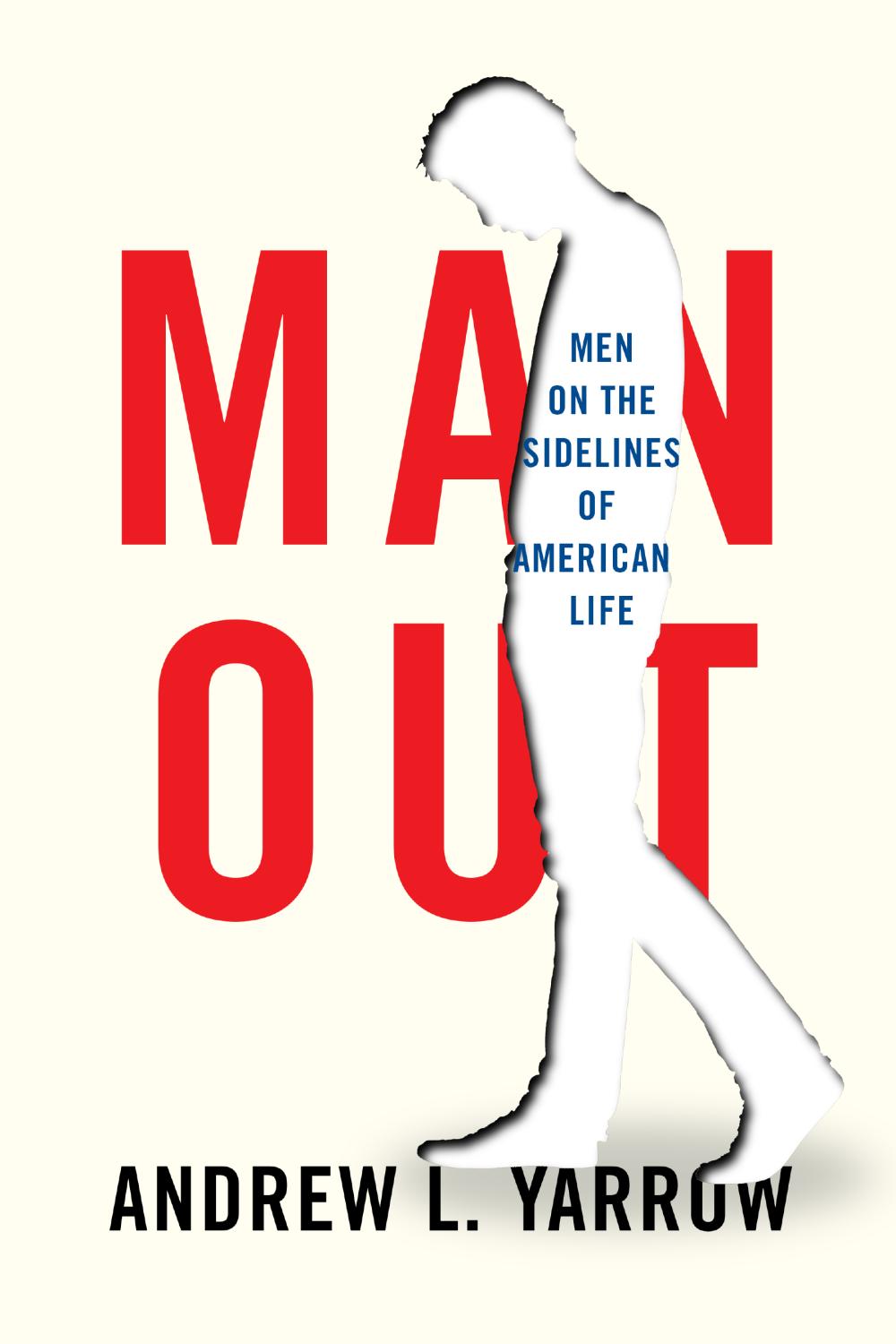Guy Troubles
The story of men who are hurting—and hurting America by their absence
Man Out describes the millions of men on the sidelines of life in the United States. Many of them have been pushed out of the mainstream because of an economy and society where the odds are stacked against them; others have chosen to be on the outskirts of twenty-first-century America. These men are disconnected from work, personal relationships, family and children, and civic and community life. They may be angry at government, employers, women, and “the system” in general—and millions of them have done time in prison and have cast aside many social norms.
Sadly, too many of these men are unsure what it means to be a man in contemporary society. Wives or partners reject them; children are estranged from them; and family, friends, and neighbors are embarrassed by them. Many have disappeared into a netherworld of drugs, alcohol, poor health, loneliness, misogyny, economic insecurity, online gaming, pornography, other off-the-grid corners of the internet, and a fantasy world of starting their own business or even writing the Great American novel.
Most of the men described in this book are poorly educated, with low incomes and often with very few prospects for rewarding employment. They are also disproportionately found among millennials, those over 50, and African American men. Increasingly, however, these lost men are discovered even in tony suburbs and throughout the nation. It is a myth that men on the outer corners of society are only lower-middle-class white men dislocated by technology and globalization.
Unlike those who primarily blame an unjust economy, government policies, or a culture sanctioning “laziness,” Man Out explores the complex interplay between economics and culture. It rejects the politically charged dichotomy of seeing such men as either victims or culprits. These men are hurting, and in turn they are hurting families and hurting America. It is essential to address their problems.
Man Out draws on a wide range of data and existing research as well as interviews with several hundred men, women, and a wide variety of economists and other social scientists, social service providers and physicians, and with employers, through a national online survey and in-depth fieldwork in several communities.
Praise for Man Out
Andrew Yarrow’s Man Out: Men on the Sidelines of American Life has a compelling story to tell about millions of American men and the society in which they live. Yarrow’s explicit goal is ‘to bring awareness’ to the complexities of this ‘growing subculture of men.’ He makes the case that these sidelined men cannot be easily summarized, and powerfully shows the intersection of work lives and family lives for these men—an issue so often missing in discussions of men. His masterful book provides a much needed, comprehensive, and thoughtful perspective on these men and their lives.
—Naomi Cahn, Harold H. Greene Professor of Law at the George Washington University Law School and co-author of the forthcoming Shafted: Why Women Are Losing and What to Do About It
What’s the matter with men? It’s a question many are urgently asking—especially since Donald Trump’s election—but few are expertly answering. The eminent policy analyst Andrew Yarrow fills the gap with a book that is at once readable and rigorous, fast-moving and fairminded. Man Out shows why tens of millions of men are on the sidelines of economic, family, and public life. More important, it shows how they might be brought back in.
—Jacob S. Hacker, Stanley B. Resor Professor of Political Science, Yale University
Through the compelling stories in this book, the always prescient Andrew Yarrow makes us pause before we stereotype men or subsets of men to behave in certain ways because of where they live, how they were educated, or their income, race, or attitude toward Donald Trump. Before any of us ever again makes some simplistic statement about what is happening to ‘men,’ we had best inform ourselves first by reading Yarrow.
—C. Eugene Steuerle, institute fellow and Richard B. Fisher Chair, Urban Institute
Many working-class and poor men are falling behind—both relative to where their fathers stood and where the women in their lives now stand. In Man Out, Andrew Yarrow tells the story of these men and the ways they have become disconnected from our most fundamental institutions: work, marriage, and community. This powerful book ends with an urgent call to redefine and revive a model of masculinity for the twenty-first century, a model that will help men do better for themselves and for the people in their lives—including the women and children in their lives.
—Brad Wilcox, senior fellow, Institute for Family Studies and visiting scholar, American Enterprise Institute
Yarrow (senior fellow, Progressive Policy Institute) gives voice to the nearly 25 million men who are on what he considers “the sidelines of America,” missing from much of mainstream daily life in their communities. Who these men are, how this happened, and what can be done to change it are the focal points of this timely, well-written, thoroughly researched exposé. . . . He explores the intersection of culture, economics, politics, and human agency in this process to paint a more nuanced and sophisticated portrait of these men and the consequences their situation poses for the future of dating, marriage, fatherhood, health, work, and civic and community life. A must for those interested in gender or masculinity studies. Highly recommended.
—CHOICE
Author
Andrew L. Yarrow, a senior fellow at the Progressive Policy Institute, has been a New York Times reporter, a Labor Department speechwriter, and a U.S. history professor at American University, and has been affiliated with the Brookings Institution and the Aspen Institute. He has published four previous books, writes frequently for national media, and also has worked or consulted for Public Agenda, Oxfam America, the Export-Import Bank, the World Bank, UNICEF, the U.S. Department of Education, and the Kettering Foundation.
Media Coverage
‘Man Out: Men on the Sidelines of American Life’ by Andrew L. Yarrow

